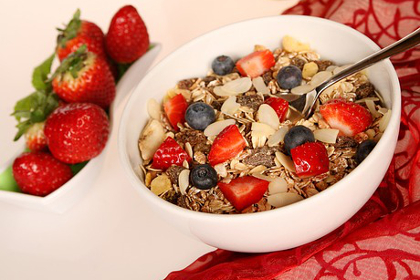
Private Tests Show Cancer-Linked Herbicide in Breakfast Foods; FDA mum on Its Assessments
If you started your day off with a whole wheat bagel and a bowl of instant strawberries-and-cream-flavored oatmeal today, you might think you made some fairly healthy breakfast choices.
You might want to think again.
April 19, 2016 | Source: Huffington Post | by Carey Gillam
If you started your day off with a whole wheat bagel and a bowl of instant strawberries-and-cream-flavored oatmeal today, you might think you made some fairly healthy breakfast choices.
You might want to think again.
According to a report released Tuesday by the Alliance for Natural Health USA, testing procured from an independent laboratory found detectable levels of the herbicide glyphosate in oatmeal and bagels as well as coffee creamer and seven more products, for a total of 10 out of 24 breakfast food items showing levels of glyphosate – a chemical the World Health Organization’s cancer experts have linked to cancer.
Notably, some of the highest levels of the chemical were detected in organic food products, including eggs marketed as “organic, cage-free, antibiotic-free” eggs; and in organic bagels and bread. Indeed, the organic cage-free eggs contained more glyphosate than regulators allow, the group said. The group also tested flour, corn flakes, instant oatmeal, yogurt, frozen hash browns, and coffee creamers.
The laboratory that conducted the tests was Microbe Inotech Laboratories in St. Louis. Microbe, founded by former Monsanto Co. scientist Bruce Hemming, has been sought out by an array of food companies, consumer groups and others to conduct glyphosate residue testing over the last few years.
The ANH said the findings indicate that glyphosate is entering the food supply in a variety of ways, including being sprayed on crops like wheat to help accelerate the crop into harvest, and through livestock feed that accumulates in poultry and other animals. Corn and soybeans, chief ingredients in livestock feed, are genetically engineered to withstand being sprayed directly with glyphosate herbicides. Wheat, used to make bread, is not.
ANH said its testing indicates that “Americans are consuming glyphosate in common foods on a daily basis.” The group acknowledged that most of the samples that showed glyphosate residue registered at levels below what U.S. regulators consider an “allowable daily intake.” But ANH pointed out that what is considered safe in the United States is far higher than what is allowed in the European Union, and said that some critics believe commercial formulations of glyphosate-based herbicides are more toxic than glyphosate alone.
“The fact that it is showing up in foods like eggs and coffee creamer, which don’t directly contact the herbicide, shows that it’s being passed on by animals who ingest it in their feed,” said Gretchen DuBeau, executive and legal director of ANH-USA. “This is contrary to everything that regulators and industry scientists have been telling the public.”
